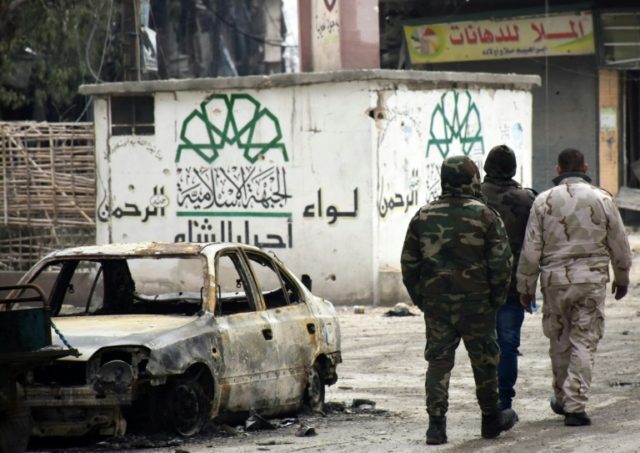Beirut (AFP) – The coming together of several factions of Syrian rebels against the country’s former Al-Qaeda affiliate has upped the ante against the jihadists following their exclusion from peace talks.
Six factions have joined the powerful Ahrar al-Sham group in the battle against Fateh al-Sham Front, which changed its name from Al-Nusra Front last year after breaking ties with Al-Qaeda.
Analysts say this comes as Fateh al-Sham seeks to intimidate its previous allies, as it feels it is being isolated from the armed opposition amid air strikes against the jihadist group.
Fateh al-Sham — which is listed internationally as a “terrorist” group — has been excluded from both a fragile nationwide ceasefire in force since December 30 and peace talks held this week in Kazakhstan.
It has been hit in recent weeks by a series of deadly air strikes, most believed to have been carried out by the US-led coalition fighting jihadists.
The Syrian Observatory for Human Rights, a Britain-based monitor, has said Fateh al-Sham appears to believe that local rebels were providing coordinates for the strikes.
The infighting comes after years of Fateh al-Sham battling alongside rebels against President Bashar al-Assad’s forces in Idlib province, which is the last major bastion of the armed opposition.
The alliance has complicated the support of Western countries for the armed opposition.
– ‘Pre-emptive’ attack –
Earlier this week, the jihadist group accused rebels of having brokered a deal to “fight Fateh al-Sham and isolate it”.
Fateh al-Sham attacked a rebel base, sparking fighting between it and several factions across the northern provinces of Idlib and Aleppo.
“Fateh al-Sham sees its attack as pre-emptive,” said Aymenn al-Tamimi, an expert in jihadist movements, as rebels come under pressure to dissociate themselves from the former Al-Qaeda affiliate.
He noted “the increasing frequency of US air strikes on Fateh al-Sham, which I think the US clearly intended in part as a message to other factions to stay away from merging with Fateh al-Sham.”
“The US has been intending to isolate Fateh al-Sham in the wider insurgency,” he said.
He said “the lack of condolences being paid to Fateh al-Sham by other factions for the loss of fighters and leaders at the hands of these air strikes” could show this strategy was at play.
The armed opposition has for months criticised Fateh al-Sham, accusing it of tarnishing the image of the rebellion because of its ties to Al-Qaeda despite them cutting ties to the group last year.
Tensions between both sides further piqued after the army retook the whole of Aleppo from the rebels last month and they accused each other for the fall of the northern city.
– ‘Militarily costly’ –
On Thursday, Ahrar al-Sham said in a statement it would consider all attacks against it or its bases “as a declaration of war”.
Tamimi said it was unclear how far the factions would go in their fight, but “Ahrar al-Sham did make clear it is trying to act to deter any aggressive action rather than totally eliminate and isolate Fateh al-Sham.”
However, “if it does escalate to an existential war, then I have no doubt Fateh al-Sham will defend its holdings to the end,” he said.
“Losing out in Idlib would mean the end of Fateh al-Sham as a major player in the Syrian insurgency.”
Syria specialist Thomas Pierret said Fateh al-Sham was “taking series of strategic positions to intimidate the factions”, but both sides had no interest in continuing the fighting.
The rebels “know a direct confrontation with a jihadist faction of this scope would be suicidal,” he said.
And Ahrar al-Sham knew a fight to death with Fateh al-Sham would be “militarily costly”.
At the end of Astana, regime supporters Russia and Iran and rebel backer Turkey stressed their determination to fight jihadist groups and the need to dissociate rebel groups from Fateh al-Sham.
Syria’s conflict has killed more than 310,000 people and displaced millions since it erupted in 2011 with the brutal repression of anti-government protests.
It has since evolved into a complex war, with the rise of jihadist groups and the involvement of international powers.

COMMENTS
Please let us know if you're having issues with commenting.